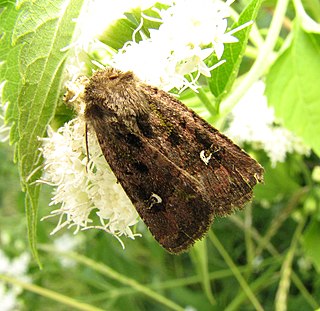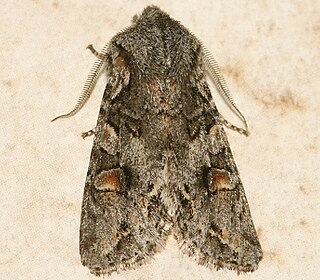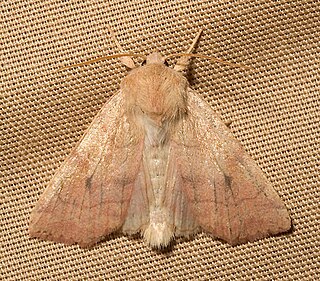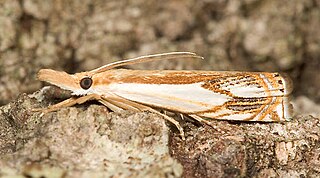
Zotheca is a monotypic genus of moths of the family Noctuidae. It contains one species: Zotheca tranquilla, or the elder moth. It is found in western North America.

Lacinipolia is a moth genus in the family Noctuidae.

Egira hiemalis is a moth of the family Noctuidae. It is found in western North America from British Columbia south to California.

Actebia fennica, the black army cutworm or Eversmann's rustic, is a moth of the family Noctuidae. The species was first described by August Michael Tauscher in 1806. It has a Holarctic distribution from Newfoundland through western Europe, Siberia, the Far East, Mongolia, northern China to Korea and Japan. In North America it is mainly found in the boreal region, south to New England, southern Montana and northern Oregon.

Herpetogramma pertextalis, commonly known as the bold-feathered grass moth, is a species of moth of the family Crambidae. It was first described by Julius Lederer in 1863 and is found in North America.

Idia americalis, the American idia or American snout, is a litter moth of the family Erebidae. The species was first described by Achille Guenée in 1854. It is commonly found in moist forests in North America, ranging from southern Canada to Florida and Texas. It is nocturnal and can be lured by sugar baits and light traps.

Psammopolia arietis is a moth of the family Noctuidae. It occurs on Pacific Coast sand beaches from Mendocino, California to south-western Alaska. It is absent from the inland Strait of Georgia.

Enargia infumata, the lesser eyed sallow, is a moth of the family Noctuidae. It is found from Alaska and New Brunswick to Ontario, south to Connecticut in eastern North America. In western North America it is found from Saskatchewan and Alberta, south to Utah and California.

Crambus agitatellus, the double-banded grass-veneer moth, is a moth of the family Crambidae. The species was first described by James Brackenridge Clemens in 1860. Adults are on wing from June to August.

Gnophaela vermiculata, sometimes known as the police-car moth or green lattice, is a moth of the family Erebidae. The species was first described by Augustus Radcliffe Grote in 1864. It is found in the Rocky Mountain region of the United States and in western parts of North America, from British Columbia to California, east to New Mexico and north to Manitoba.

The batman moth is a moth of the family Tortricidae. It was first described by James Brackenridge Clemens in 1860.

The variable sallow moth is a moth of the family Noctuidae. It is found from Connecticut to Florida and west to Missouri and Texas.
Lacinipolia incurva is a species of moth in the family Noctuidae. It was described by John B. Smith in 1888 and is found in North America, where it has been recorded from California, Arizona, New Mexico, Texas, Utah and Colorado.
Homorthodes dubia is a species of cutworm or dart moth in the family Noctuidae. It was described by William Barnes and James Halliday McDunnough in 1912 and is found in North America.

Lacinipolia triplehorni is a species of cutworm in the family Noctuidae. It is found in North America.

Lacinipolia patalis is a species of cutworm or dart moth in the family Noctuidae. It is found in North America.

Macronoctua onusta, commonly known as the iris borer, is a species of cutworm or dart moth in the family Noctuidae. It is found in North America.

Lacinipolia strigicollis, the collared arches moth, is a species of cutworm or dart moth in the family Noctuidae. It is found in North America.
Acopa perpallida is a species of moth in the family Noctuidae. It is found in North America.
Acontia coquillettii is a species of bird dropping moth in the family Noctuidae. It is found in North America.

















